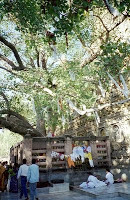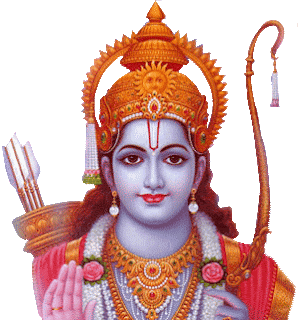Aaditya Hrudayam
The Heart of Aditya (the Sun God)
Aaditya Hrudayam is a hymn associated with Aditya or the Sun God and was recited by the sage Agastya to Rama on the battlefield before fighting with Ravana. This historic hymn starts at the beginning of the duel between Rama and Ravana. Agastya teaches Rama, who is fatigued after the long battle with various warriors of Lanka, the procedure of worshiping the Sun god for strength to defeat the enemy. These verses belong to Yuddha Khanda, in the Ramayana as composed by Valmiki.
Thing to be noted is this hymn is older than the ancient epic Ramayana.
The benefits of chanting Aaditya Hrudayam daily
It is a very powerful hymn to get
+ Sharpness,tejas,intelligent
+ victory over external enemies (foes)
+ internal enemies (weaknesses such as lust, anger, jealousy etc.)
+ long life and good health, destruction of sins, dissolution of worries and anxeity, long lasting prosperity and auspicious qualities.
Aditya = the Sun God; Hridayam = that which is especially nourishing and healing for the heart.
In simple words, Aaditya Hrudayam is the worship to the Sun God.
 |
| Sun |
Aaditya Hrudayam
Tato yuddhaparishraantam samare chintayaa sthitam.raavanam chaagrato dr.ushtva yuddhaaya samupasthitam.1
Rama, exhausted and about to face Ravana ready for a fresh battle was lost deep in contemplation.
Daivataishcha samaagamya drashhtumabhyaagato ranam upaagamyaa braviidraama magastyo bhagavaan rishhi. 2
The all knowing sage Agastya who had joined the Gods to witness the battle spoke to Rama thus
Raama Raama mahaabaaho shrnu guhyam sanaatanam yena sarvaanariinvatsa samare vijayishhyasi. 3
Oh Rama, mighty-armed Rama, listen to this eternal secret, which will help you destroy all your enemies in battle
Aaditya hrudayam punyam sarva shatru vinaashanam Jayaavaham japennityam akshayyam paramam shivam. 4
This holy hymn dedicated to the Sun deity will result in destroying all enemies and bring you victory and never ending supreme bliss.
Sarvamangalamaangalyam sarvapaapapranaashanam. Chintaashokaprashamanam aayurvardhanamuttama. 5
This hymn is supreme and is a guarantee of complete prosperity and is the destroyer of sin, anxiety, anguish and is the bestower of longevity.
Rashmimantam samudyantam devaasuranamaskrutam. Puujayasva vivasvantam bhaaskaram bhuvaneshvaram. 6
Worship the One, possessed of rays when he has completely risen, held in reverence by the devas and asuras, and who is the Lord of the universe by whose efflugence all else brighten.
Sarvadevaatmako hyeshha tejasvii rashmibhaavanah.Eshha devaasuraganaa.nllokaan paati gabhastibh. 7
He indeed represent the totality of all celestial beings. He is self-luminous and sustains all with his rays. He nourishes and energizes the inhabitants of all the worlds and the race of Devas and Asuras.
Eshhah brahmaa cha vishhnushcha shivah skandah prajaapati. Mahendro dhanadah kaalo yamah somo hyapaam pati. 8
He is Brahma, Vishnu, Shiva, Skanda, Prajapati. He is also Mahendra, kubera, kala, yama, soma and varuna.
Pitaro vasavah saadhyaa hyashvinau maruto manuh.Vaayurvahnih prajaapraana ritukartaa prabhaakarah. 9
He is the pitrs, vasus, sadhyas, aswini devas, maruts, manu, vayu, agni, prana and, being the source of all energy and light, is the maker of all the six seasons.
Aadityah savitaa suuryah khagah puushhaa gabhastimaan. Suvarnasadrsho bhaanu rvishvaretaa divaakarah. 10
He is the son of Aditi, creator of the universe, inspirer of action, transverser of the heavens. He is the sustainer, illumination of all directions, the golden hued brilliance and is the maker of the day.
Haridashvah sahasraarchih saptasaptirmariichimaan. Timironmathanah shambhustvashhtaa maartandam anshumaan. 11
He is the Omnipresent One who pervades all with countless rays. He is the power behind the seven sense organs, the dispeller of darkness, bestower of happiness and prosperity, the remover of misfortunes and is the infuser of life.
Hiranyagarbhah shishirastapano bhaaskaro ravihi Agnigarbhoaditeh putrah shankha shishiranaashanah. 12
He is the primordial being manifesting as the Trinity. He ushers in the Day and is the teacher (of Hiranyagarbha), the fire-wombed, the son of Aditi, and has a vast and supreme felicity. He is the remover of intellectual dull-headedness.
Vyomanaatha stamobhedii rig yajuh saama paaragah. Ghana vrishhti rapaam mitro vindhya viithii plavangama... 13
He is the Lord of the firmament, dispeller of darkness. Master of all the vedas, he is a friend of the waters and causes rain. HE has crossed the vindya range and sports in the Brahma Nadi.
Aatapii mandalii mrityuh pingalah sarvataapanah. Kavirvishvo mahaatejaa raktah ssarva bhavod hbhava. 14
He, whose form is circular and is colored yellow, is intensely absorbed and inflicts death. He is the destroyer of all and is the Omniscient one being exceedingly energetic sustains the universe and all action.
Nakshatra grahataaraanaam adhipo vishva bhaavanah. Tejasaamapi tejasvii dvaadashaatman namostute 15
He is the lord of stars, planets and all constellations. He is the origin of everything in the universe and is the cause of the lustre of even the brilliant ones. Salutations to Thee who is the One being manifest in the twelve forms of the Sun.
Namah puurvaaya giraye pashchimaayaadraye namah. Jyotirganaanaam pataye dinadhipataye nama. 16
Salutations to the Eastern and western mountain, Salutations to the Lord of the stellar bodies and the Lord of the Day.
Jayaaya jayabhadraaya haryashvaaya namo namah. Namo namah sahasraansha aadityaaya namo nama. 17
Salutations to the One who ordains victory and the prosperity that follows. Salutations to the one possessed of yellow steeds and to the thousand rayed Lord, and to Aditya.
Namah ugraaya viiraaya saarangaaya namo namah. Namah padma prabodhaaya maartandaaya namo nama. 18
Salutations to the Terrible one, the hero, the one that travels fast. Salutations to the one whose emergence makes the lotus blossom and to the fierce and omnipotent one.
Brahmeshaana achyuteshaaya suuryaayaadityavarchase. Bhaasvate sarvabhakshaaya raudraaya vapushhe nama. 19
Salutations to the Lord of Brahma, shiva and Achyuta, salutations to the powerful and to the effulgence in the Sun that is both the illuminator and devourer of all and is of a form that is fierce like Rudra.
Tamoghnaaya himagnaaya shatrughnaaya amitaatmane. Kritaghnahanaaya devaaya jyotishhaam pataye nama. 20
Salutations to he transcendental atman that dispels darkness, drives away all fear, and destroys all foes. Salutations also to the annihilator of the ungrateful and to the Lord of all the stellar bodies.
Tapta chaamiika raabhaaya haraye vishvakarmane. Namastamo.abhinighnaaya ruchaye lokasaakshine 21
Salutations to the Lord shining like molten gold, to the transcendental fire, the fire of supreme knowledge, the architect of the universe, destroyer of darkness and salutations again to the effulgence that is the Cosmic witness.
Naashayatyeshha vai bhuutam tadeva srijati prabhuuH. Paayatyeshha tapatyeshha varshhatyeshha gabhastibhi. 22
Salutations to the Lord who destroys everything and creates them again. Salutations to Him who by His rays consumes the waters, heats them up and sends them down as rain.
Eshha supteshhu jaagarti bhuuteshhu parinishhthitah. Eshha evaagnihotramcha phalam chaivaagnihotrinaam. 23
Salutations to the Lord who abides in the heart of all beings keeping awake when they are asleep. He is both the sacrificial fire and the fruit enjoyed by the worshippers.
Vedaashcha kratavashchaiva kratuunaam phalameva cha. Yaani krityaani lokeshhu sarva eshha ravih prabhu. 24
The Sun is verily the Lord of all action in this universe. He is verily the vedas, the sacrifices mentioned in them and the fruits obtained by performing the sacrifices.
Phala stuti
Enamaapatsu krichchhreshhu kaantaareshhu bhayeshhu cha.kiirttayanh purushhah kashchin naavasiidati raaghav. 25
Raghava, one who recites this hymn in times of danger, during an affliction or when lost in the wilderness and having fear, he will not lose heart (and become brave).
Puujayasvainamekaagro devadevam jagathpatimh. Etat.h trigunitam japtvaa yuddheshhu vijayishhyas. 26
 |
| Aaditya Hrudayam |
Raghava, worship this Lord of all Gods and the Universe with one-pointed devotion. Recite this hymn thrice and you will win this battle.
Asminkshane mahaabaaho raavanam tvam vadhishhyasi. Evamuktavaa tadaa.agastyo jagaama cha yathaagatam. 27
O mighty armed one, you shall truimph over Ravana this very moment. Having spoken this, Agastya returned his original place. Raghava became free from worry after hearing this.
Etachchhritvaa mahaatejaa nashhtashoko abhavattadaa. Dhaarayaamaasa supriito raaghavah prayataatmavaan. 28
He was greatly pleased and became brave and energetic.
Aaadityam prekshya japtvaa tu param harshhamavaaptavaanh. Triraachamya shuchirbhuutvaa dhanuraadaaya viiryavaan. 29
Gazing at the sun with devotion, He recited this hymn thrice and experienced bliss.
Rraavanam prekshya hrushhtaatmaa yuddhaaya samupaagamath. Sarva yatnena mahataa vadhe tasya dhritoabhavat. 30
Purifying Himself by sipping water thrice, He took up His bow with His mighty arms. Seeing Ravana coming to fight, He put forth all his effort with a determination to destroy Ravana.
Atha ravi ravadanam nirikshyam raama Muditamanaah paramam prahrishhyamaanah. Nishicharapatisa nkshayam viditvaa Suragan amadhyagato vachastvaret. 31
Then knowing that the destruction of the lord of prowlers at night (Ravana) was near, Aditya, who was at the center of the assembly of the Gods, looked at Rama and exclaimed 'Hurry up' with great delight. Purifying Himself by sipping water thrice, He took up His bow with His mighty arms. Seeing Ravana coming to fight, He put forth all his effort with a determination to destroy Ravana. Source - Wikipedia

























Post a Comment